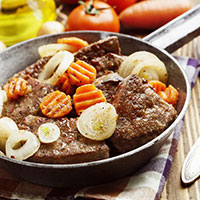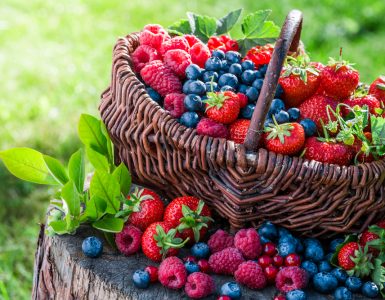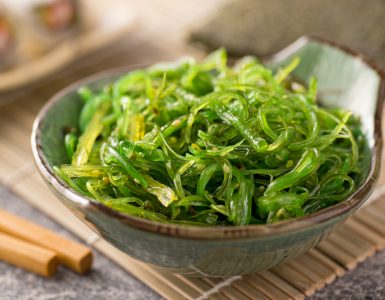| Vitamin name |
Vitamin A |
| What’s it used for? | Good eyesight, especially night vision; protects and moisturises inner skin membranes |
| Best food sources | Animal products such a fish liver oils, egg yolks, dairy and fortified margarine |
| How much do I need? | NRV is 800 ug per day* |
| Need to know | Pro vitamin A, mainly in the form of beta carotene, is found in fruits and vegetables and converts to usable vitamin A in the body |
*A Nutrient Reference Value or NRV is the recommended level set by the UK Department of Health for daily nutrient intake
Vitamin A
Vitamin A is also known as retinol – so-called because of its importance in vision; the rods of the eye which are located within the retina need vitamin A for good eyesight. Vitamin A’s most important function is for eyesight and visual adaptation to darkness.
Why do I need it?
Whilst it’s essential for vision, vitamin A is also important for proper immune function, partly due to its amazing anti-viral effects.
Whilst vitamin A delivers impressive antioxidant protection, helping to prevent the ageing process and degenerative diseases, the carotenes are actually more powerful. Carotenes, found especially in red, yellow and orange foods are converted in the body to create vitamin A as needed; they also deliver wonderful health benefits in their own right. Certain fruits and vegetables contain carotene pigments which can be converted into vitamin A in the body and are termed pro-vitamin A. Beta carotene, found in carrots, yields the most vitamin A.
Vitamin A plays a key role in growth and development by stimulating processes needed for cellular activity. This activity plays key role in skin repair and protection of mucous membranes. Vitamin A is needed for skin repair and tissue healing because it stimulates growth at the base layer of the skin, or epidermis; a synthetic form of vitamin A – retinoic acid – has been developed to effectively treat many skin conditions.
Best food sources
Pre-formed vitamin A or retinol is found only in animal sources, the richest being fish liver oils. However, since vitamin A is fat-soluble and stored in the liver, beef, calf or chicken liver are also good sources. Yellow and orange fruits and vegetables deliver excellent sources of pro vitamin A.
Foods high in vitamin A

Beef liver – 13,183 ug per 100g

Chicken liver – 3,363 ug per 100g

Carrots – 3,303 ug per 100g

Kale – 2,672 ug per 100g

Sweet potato – 2,642 ug per 100g
Are you getting enough?
Severe vitamin A deficiency is rare in the developed world. However, people suffering from malabsorption issues or liver problems can sometimes show deficiency symptoms, particularly with poor immunity, and so become susceptible to infections. Skin problems can also manifest in the form of dryness; bumpy skin on the back of the arms is a sign of vitamin A deficiency. Also poor eyesight and night vision, and loss of appetite may be experienced with vitamin A deficiency.
Did you know?
Vitamin A was the first fat-soluble vitamin to be discovered, hence being labelled ‘A’The Department of Health recommends that women who are trying to get pregnant, or are within their first trimester, should not eat liver or take supplements with high levels of vitamin A; high dosages can cause foetal abnormalities
It is safe to take the recommended daily amount of 800ug during pregnancy to ensure good eye development of the growing baby – consult your healthcare professional for further advice
Vitamin A can be depleted in the body by high alcohol intake, cortisone medication (used to treat inflammatory conditions) and excessive iron intake
For all the latest research on vitamin A click here
Try this
Vitamin A is found in the Alive! range of multi vitamins and minerals.
For more information visit www.feelaliveuk.com
You can also follow Alive! on Twitter for general health and wellbeing tips: @feelaliveuk








